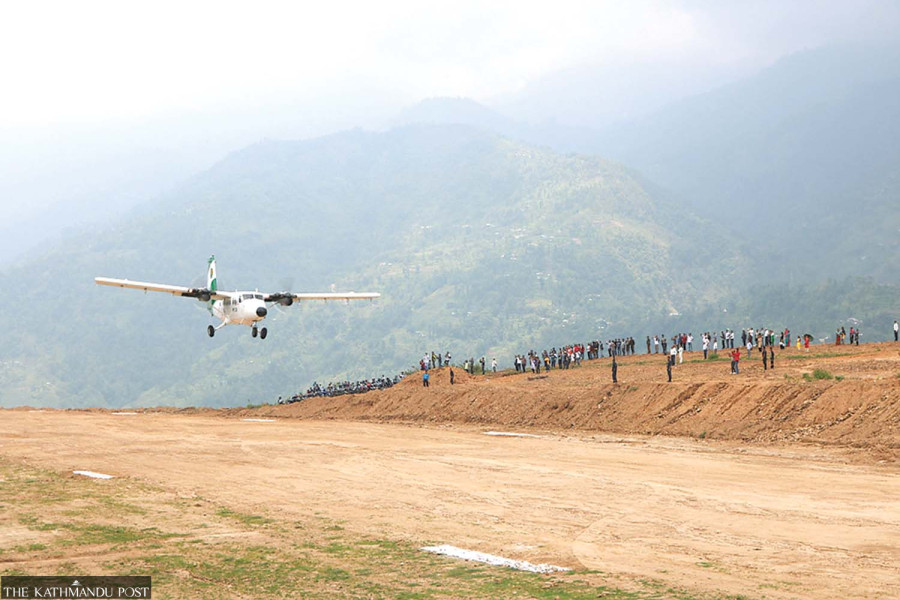Money
Ministry revises draft bill on airline liability and insurance
Under proposed law, domestic airlines will be liable to pay up to $100,000 for a passenger casualty in accident.
Sangam Prasain
The Ministry of Culture, Tourism, and Civil Aviation has revised the draft bill governing domestic airlines’ liability and insurance responsibilities, and invited public feedback on it.
The updated draft, now available on the ministry’s website, signals a renewed push to advance long-stalled aviation reforms following Nepal’s ratification of the Montreal Convention 1999 in December 2018.
While the Montreal Convention applies only to international air travel, this draft aims to align Nepal’s domestic aviation liability framework with global standards, said a ministry official.
The revised legislation outlines passengers’ rights and airline obligations during accidents, delays, or disruptions, aiming to ensure clarity and accountability across the sector.
The bill, which has been dormant since 2019, proposes comprehensive rules on passenger compensation, cargo liability, insurance coverage, and conditions under which carriers are exempt from responsibility.
The ministry has given a seven-day window for public feedback. After that, the draft will be submitted to the Ministry of Law for legal scrutiny.
Upon approval, it will move to the Cabinet before being tabled in Parliament.
Under the proposed provisions, domestic airlines will be liable to pay compensation up to $100,000 if a passenger suffers serious injury, physical harm, or death due to an accident during boarding, flight, or disembarkation. In fatal cases, the compensation must be paid to the deceased passenger’s nearest legal heir.
In comparison, the Montreal Convention sets the liability cap at $202,500 for death or injury during international flights. This limit was last revised on December 28, 2024.
The draft bill requires airlines to arrange for appropriate medical treatment in cases of non-fatal injury or disability caused by an accident. In the event of a passenger’s death, the airline is responsible for returning the body to the family and providing advance payments to help cover immediate funeral and transport costs.
The draft also mandates compensation for flight delays and cancellations. If a scheduled flight is delayed or cancelled, passengers holding valid tickets must be informed at least three hours before the revised departure time.
If a flight is overbooked or unable to accommodate a ticketed passenger, the airline must offer one of the following: an alternative seat on another carrier flying to the same destination at a similar time, another immediate and cost-free travel option to the final destination, or a full refund with immediate ticket cancellation.
Clear guidelines have also been laid out for baggage-related claims. If checked luggage is lost or damaged, airlines must compensate up to $20 per kilogram, not exceeding a total of $5,000, to be paid in Nepali currency.
For unchecked baggage—items carried by passengers into the cabin—the airline must compensate up to $400, also in local currency, for loss or damage.
The draft sets a liability cap of $20 per kilogram for loss or damage to cargo unless the shipper has explicitly declared a higher value in writing. Airlines are deemed responsible for losses resulting from negligence by the airline, its staff, or authorised agents.
The airline must compensate the affected party if the cargo is not delivered on time. The cargo is considered undelivered if it does not arrive within three days when no specific delivery date was agreed upon. It is officially regarded as lost if it is not delivered within 15 days of the scheduled date or within 30 days of acceptance if no delivery time was set.
The bill also outlines scenarios under which airlines are exempt from liability. Airlines will not be held responsible for delays or cancellations resulting from weather disturbances, natural disasters, airport or air traffic service disruptions, or security-related restrictions imposed by government authorities.
Additionally, the airline is not liable if injury or harm results from the passenger’s gross negligence or a pre-existing medical condition, provided the airline can produce evidence supporting its claim.
The draft also includes provisions related to third-party liability in the event of aircraft accidents.
It sets mandatory insurance coverage based on the aircraft’s weight: $25 million for aircraft weighing up to 10,000 kilograms, $35 million for those between 10,001 and 35,000 kilograms, and $60 million for aircraft over 35,000 kilograms.
If a passenger is injured or disabled during a flight, claims for compensation and medical costs must be filed with the airline or its agent within 60 days, supported by the necessary documentation. If the airline rebuts the claim, the affected party may file a lawsuit in a relevant court within 35 days of receiving the notice.
The draft introduces the concept of unlimited liability for some instances.
Compensation for injuries or disabilities will be calculated based on the severity of the harm, the resulting loss of income, and the long-term impact on the passenger’s earning ability.
Further, the bill directs the government to review compensation limits every 10 years and adjust them according to inflation and current market conditions. Any such revisions must be officially published in the Nepal Gazette.




 10.12°C Kathmandu
10.12°C Kathmandu














